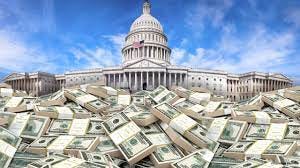Don’t Look Up
Recently I watched a movie called “Don't Look Up”, a comedy-disaster spoof where astronomers discover a comet that will strike the earth and destroy everything. But nobody cares. The U.S. President’s reaction to the news about the comet is: How will this affect my polling numbers?
But there is a real-life metaphor going on that is eerily similar: the federal debt.
Economists, pundits, prognosticators, and libertarians such as yours truly have been pointing to the spiraling federal deficit for many decades, warning that a disaster is heading our way. This issue is once again in the news, as the U.S., once again, approaches the National Debt Limit. The current limit is $31.4 Trillion. If Congress does not raise it by June 4, then the U.S. will default on its debt, leading to (we are told) horrible consequences.
Will Congress raise the limit? Duh. Of course they will.
Then what? Is the impending crisis over for good?
Dream on. A few years down the road, it will happen again. And again. And again. And so on.
The seeds of this crisis were firmly planted with the creation of the Federal Reserve, and the abolition of the gold standard that previously backed our currency. Under the guise of “promoting the general welfare”, the government could now print and spend all the paper dollars it wanted, without accountability. The rest is history.
The U.S. Federal Budget for 2023 is $5.8 Trillion. Divided into a population of 300 million, that’s about $20 Thousand a year for every man, woman, and child (and that does not count state and local spending). Do not think for one minute that “somebody else” pays your portion, for like it or not, you are somebody else’s “somebody else.” And it really doesn’t matter whether the government pays it via taxes, or borrowing, or currency debouchment. Either way, it comes out of your pocket.
Side note: if government borrows most of the money, like it does now, the interest payments involved make it grow even faster.
And so, over time, government spending grows exponentially; the rate of growth grows. On a graph, it’s an upward-curving line. As I pontificated in my article, we’ll have a $10 Trillion budget by 2030. And a $100 Trillion budget by 2040. After that, I think “Quadrillion” is next. We’ll long for the good ole’ days when budgets were measured in mere Trillions.
Anyway, back to 2040: assuming a stable population, that divides out to about $333 Thousand a year for each and every U.S. citizen. Can you afford that? And that’s only 17 years away, folks. If you think our current Debt Ceiling crisis is bad, you ain’t seen nothing yet.
Could a great, successful, wealthy nation such as the United States, conceived in liberty and the concept of limitedgovernment, actually be destroyed from within by its own government? Well, it’s happened before in history.
So how the heck do we prevent this? Well, one way is for politicians to address this reality and actually get serious about cutting spending.
I know - that’s hilarious!! When you finish laughing your *** off, finish reading:
Another option is to realize that the true guilty party is the voter who agrees with this statement: “Yeah, government spends too much, but you cannot cut [fill in the blank with name of favorite program] because that’s important!!”
So just how do we stop spiraling out-of-control government spending and avert disaster?
Don’t look up.






The debt problem is actually much easier to solve than by "spending less" --- just stop "spending more". Don't "cut" anything - just don't increase the budget any MORE and we would naturally grow the economy and tax revenue to cover annual deficits. As for the debt itself, a portion of that 31T is scheduled to be retired - paid off - every year. Paying off the debt is already part of the annual budget. But only if government isn't accelerating spending. If the government identifies a program that MUST be increased beyond inflation, then it must identify something that they will cut commensurate with the increase. This isn't pie in the sky wishful thinking. It's not contrarian logic. It is exactly how the government has all along planned to reduce the debt and it's what both Republicans and Democrats are willing to agree to. The only question is WHEN they will commit to doing it.